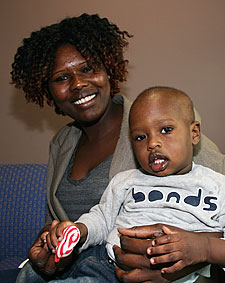For the first time, Portuguese children and grandparents are learning English thanks to a developing ministry run by Kathryn and Stuart Broughton of All Saints’ Petersham.
Some of the students are grandparents, who have taken on the considerable challenge of learning a new language in their 50s and 60s.
Many of them came to Australia in the 1970s, having experienced hardship under the Salazar dictatorship, and then the communist and socialist governments that followed in their homeland.
In spite of the fact that they have had only around four years' schooling, which is generally the literacy level of a 10-year-old, Kathryn says she admires their perseverance and ability to build successful lives in a foreign city.
"A lot of them came 30 to 40 years ago, and the next day they were working in a factory with other Portuguese," she says.
"They never had the chance to learn English because they were into the workplace straight away to repay the expenses of travelling here."
 Kathryn fears some may soon stop coming to the classes as the learning is difficult for them, and hopes to encourage these students and give them the attention they need.
Kathryn fears some may soon stop coming to the classes as the learning is difficult for them, and hopes to encourage these students and give them the attention they need.
"There are now gaps opening up between the old Portuguese, who are illiterate in their own language, and the younger ones who are quicker and more literate."
For the last five weeks, Kathryn's 37 Portuguese students have been attending the five classes she runs on Wednesdays and Fridays.
"Some of the classes are quite small so I've managed to make good relationships " I do love the Portuguese people and understand some of their culture and background," she says.
The classes are part of All Saints' Petersham's initiative to reach out to the surrounding community of "Little Portugal'.
All Saints' rector, the Rev Antony Barraclough, is thrilled with class numbers so far.
"We've gone from 0 to 37 in one month!" he exclaims.
Understanding a unique past
Kathryn says the Portuguese have a unique history that can be hard to understand.
Having come from a high position of cultural and colonial power in the 15th and 16th centuries, she says the difficulties experienced by the Portuguese people in recent times have left a legacy of sadness.
“Up untiil the last 15 to 20 years, they haven’t had the same educational opportunities as other European countries," she says. "They've had six interest rate rises this year, but they could be going forward as the other European countries are " and they're not."
All Saints’ hopes to incorporate the students into the life of the church, perhaps through mid-week events, with hopes for a Portuguese service sometime down the track.
Antony says the church has some ground to make up in its ministry to this people-group, but is excited about the popularity of the classes so far.
"We're decades behind so we don't see this as a quick fix," he explains.
"This is the first concerted effort to reach the Portuguese here and God has really answered the prayer for us to contact and reach them."
Lessons from the field
Stuart and Kathryn were missionaries in Brazil for 12 years, then spent time in the Democratic Republic of Congo for two years, before serving in Portugal for five years.
"In Portugal, we used ESL teaching as an outreach. The Anglican Church was regarded with suspicion there so it was a good way of attracting the young people and making the church known."
The classes include a Christian song (accompanied by Stuart on the guitar), a Bible verse and simple Bible stories aimed at familiarising students with the English language.
The class also reads a prayer every week giving thanks for health, families, and the opportunity to learn and praying for God's help to be responsible citizens who care for the needs of others.
"They say it together so they get used to the words over a period of time," she says.
Kathryn and Stuart advertised the classes in the local Portuguese papers and visited local shops to broaden awareness.
Antony says the classes are "deliberately missional in their intent", with the hope that one day some local Portuguese people will be a part of All Saints' congregation.
"This is a bigger task than we have imagined but God's grace is up to it of course."
Antony says he is delighted that All Saints' can have this ministry to the Portuguese in their midst, who have responded positively to the free classes.
"The big uptake has been really good and shows there's a need that even their own churches are not addressing," he says.



















